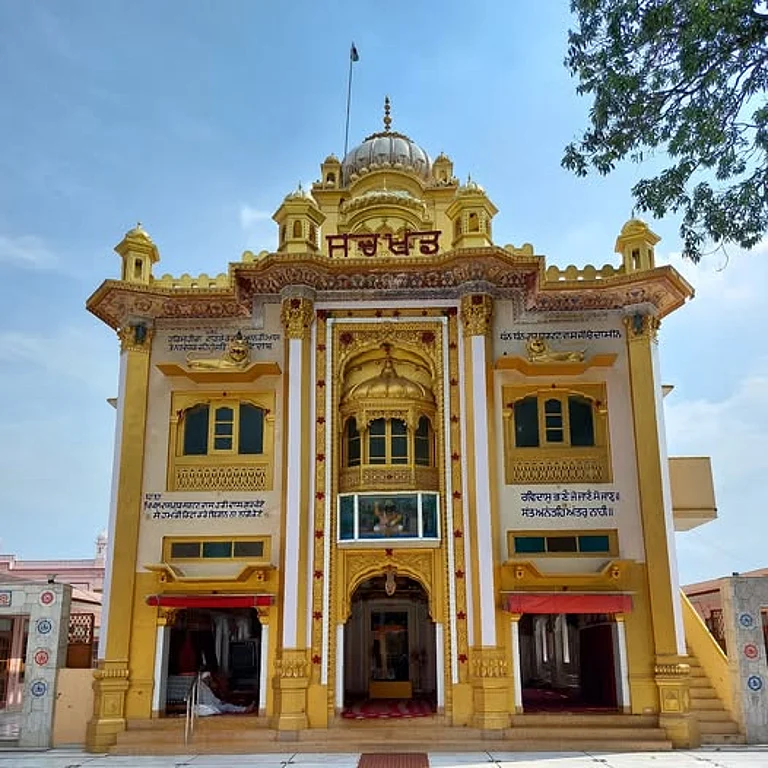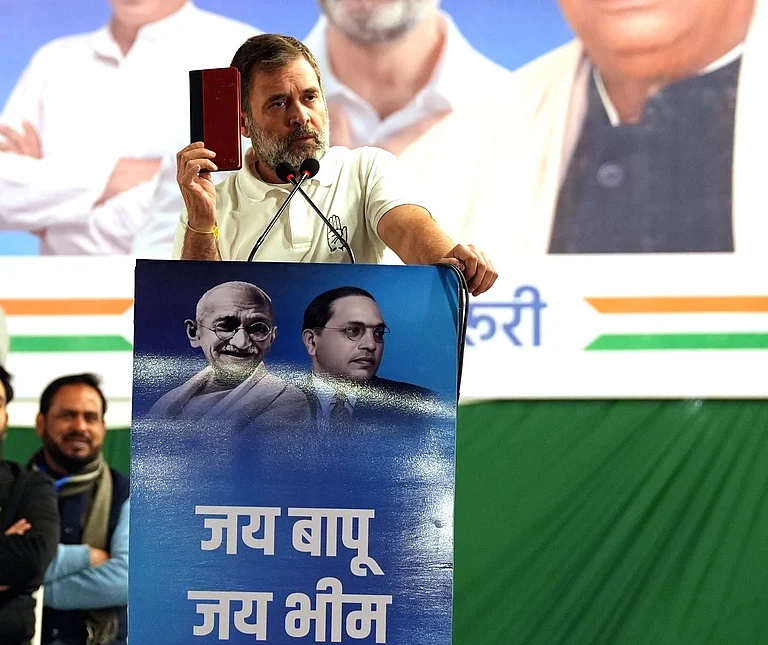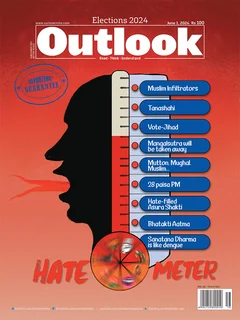Mayawati has relieved her nephew Akash Anand of his responsibilities as the Bahujan Samaj Party’s (BSP) national coordinator and as her political successor until he attains “full maturity”, but there are many other young Dalit leaders in Uttar Pradesh (UP) who are gaining prominence in state politics.
Amid the peppermint farms of Barabanki’s Karpiya village, a discussion about one of them, who is an IITian, brews. “[Tanuj] Punia ji itna bada pariksha pass kiye hain, woh chhaatron ki samasya samajhte hain (Punia ji has passed such a big exam, he understands the problems students face),” Ram Lalli, mother of six, says. The other women nod in agreement. What all of them have in common besides being the victims of rising prices and crippling hunger is having at least one or two unemployed children or family members “wasting their education, toiling on farms”. Lalli says the repeated paper leaks in UP have quashed their hopes for jobs.
In UP’s Barabanki constituency, the Congress has fielded 39-year-old Tanuj Punia, an emerging Dalit face in state politics. This is the Congress leader’s second Lok Sabha election after he lost to the Bharatiya Janata Party’s (BJP) Upendra Singh Rawat in 2019, and was, in fact, the second runner-up after the Samajwadi Party’s (SP) Ram Sagar Rawat. He also contested two legislative assembly elections from Zaidpur in Barabanki, but failed to make his mark. In the past five years, Barabanki locals have come to know him as the ‘MP who isn’t’.
“He comes and sits with us here,” Karpiya resident Shanti Devi says, pointing to the overflowing gutter stinking up the neighbourhood. It forms murky pools of water outside people’s half-built brick shacks. “He knows our names. When there’s a wedding in the village, we give him a call and he shows up. As does his father P L Punia ji. He may not be the MP but at least we see him often,” she adds.
The Punia family has had a long association with Barabanki, with P L Punia having served as the MP from 2009 to 2014. “I have a very good connection with Barabanki,” says Tanuj Punia, who has just returned home after attending ajansabha in neighbouring villages. “Even when it hasn’t been our (Congress’) wave, the people of Barabanki have stood by us…It is the public’s love. Since 2007 I have been among the people and have formed deep relationships. Especially in Barabanki, through our focused attempts, we have been able to connect with people and create a family.”
He credits his passion for social work as the driving force behind his entry into politics. “I had an interest in social work from the start,” he says. “Many people in my family have been involved in public service. Since childhood, I had seen Mausaji, Chacha ji and Papa himself always extending a helping hand to people. People would start coming to our house at 6 or 7 am with their problems and my family members would try and resolve them.”
The young Dalit leader had been preparing for the Indian Administrative Service (IAS) examinations, when on his father’s advice, he decided to venture into the political realm. “My father said you can do more for people if you are their representative, not a public servant, you can initiate things. I said but that would take me 10-15 years. He replied that since I am young, I could take time to build my political identity, and I have been at it since then.”
The reserved seat of Barabanki went to polls in the fifth phase, and for the people of Karpiya, which is dominated by scheduled castes, development and employment have emerged as the primary poll planks. “The biggest problem is that the villagers do physical labour and get Rs 300 on a good day. When they fill out forms for their children or family members for competitive exams it costs around Rs 500. That’s about two days of their mazdoori gone, but they do it in the hope of securing a better future for their children. Sometimes we save up or take loans to send children for coaching and exam preparation. So, you can imagine the devastation we feel when we are told the paper has been cancelled again due to paper leak,” local resident Savitri told Outlook.
Education, health, employment, and farmers and labourers are Tanuj Punia’s main focus in Barabanki.
She added, “We are not for or against a party, we want someone who will understand our pain and suffering and I feel Tanuj Bhaiya will get it, he’s educated and he was a student once. We have hope in him.”
Education, health, employment, and farmers and labourers are Punia’s main focus. “I have created a roadmap for Barabanki,” he says, referring to what he would do if he is elected.
***
About 200 km away, in Kaushambi’s Charwa village, there is a buzz about a “boy from London”. The “boy” in question is the SP’s candidate for Kaushambi, Pushpendra Saroj, who has returned to India after graduating with an Accounting and Management degree from Queen Mary University, London.
The 25-year-old Dalit candidate is the son of local leader Indrajit Saroj who is currently serving as the MLA of Manjhanpur constituency. Pushpendra Saroj is in the running to become the youngest MP in the history of India.
“I’m 25 years and two months old and I think I’ll be the youngest MP in Indian history if people’s blessings are with me and I win,” Pushpendra Saroj said in an exclusive interview with Outlook.
When asked if his entry into politics had just been a matter of time, he replied that he had always aspired to join the political arena, but had not anticipated it happening so early in his life. “I’ll get to spend more time among my people, more time to work for them, what more can I ask for?”
He dismisses the thought of his father’s name putting pressure on him. “There’s no pressure because my father has worked and we are not asking for votes in his name rather, on the work that he has done for the people. When we go and meet people, they are accepting the new face and they want someone to represent their voices across on the floor of Sansad Bhavan. They want someone who will respect them and will think about their welfare with a new vision.”
As the farmers of Charwa village seek shelter from the sun under a leafy tree, a political discussion involving Pushpendra Saroj is ignited. “Videsh ka pada hua naya ladka hai, yogya toh hoga” (He’s a new boy, educated overseas. He’ll be capable), Dhara Singh asserts, trying to get the others to agree. A few, not fully convinced, question how much the 25-year-old would actually know about the on-the-ground issues. “Humne toh dekha bhi nahi hai abhi tak, bas suna hai,” one of them retorts.
“Akhilesh also studied abroad, did he not show us what he was capable of when he became CM and even now as a leading politician? I’m hopeful that Pushpendra will also be successful,” Dhara Singh adds.
Although Pushpendra Saroj is looking to make his electoral debut, he says his association with Kaushambi has been an old one. “My father has been in politics in Kaushambi for over 30 years. He was born and brought up here and then committed himself towards the people and development of Kaushambi. The public knows and acknowledges this.”
MORE FROM THIS ISSUE
Tanuj Punia and Pushpendra Saroj aren’t the only emerging Dalit names in UP’s political landscape. From the Lalganj constituency, the BSP has fielded Dr Indu Chaudhury, an assistant professor at Banaras Hindu University. A devoted follower of Kanshi Ram, she has been associated with social service and the Bahujan movement. From Machhlishahr constituency, SP candidate Priya Saroj is contesting for the first time. An advocate, Saroj is the daughter of Tufani Saroj, current MLA of Kerakat in Jaunpur. He is also a three-time MP from Saidpur (twice) and Machhlishahr (once). The BJP has fielded Dr Anand Gond from Bahraich constituency, who is the son of the incumbent Akshaibar Lal Gond and holds an MBA and a Ph.D.
(This appeared in the print as 'The Young & The Restless')

































